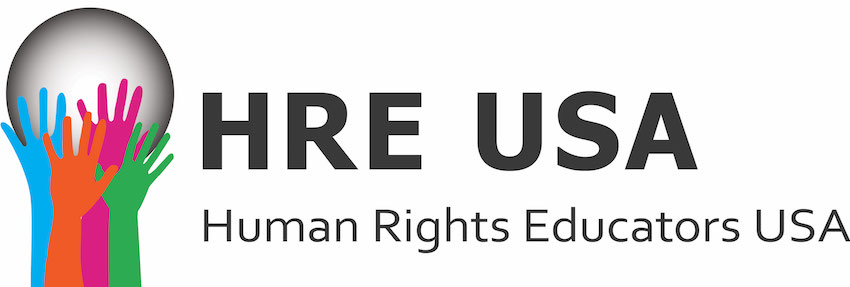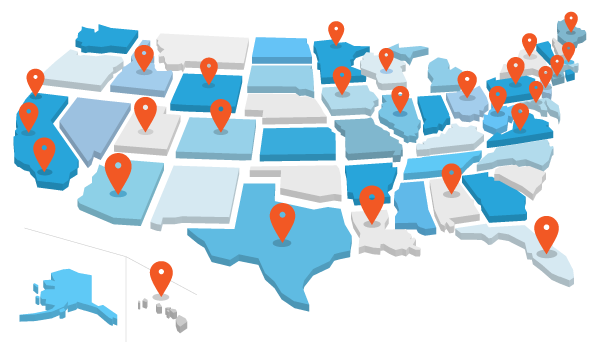HRE USA hosts and sponsors an array of webinars, workshops, and training on human rights-related topics and issues for educators and advocates.
HRE USA welcomes opportunities to collaborate with partners to host innovative human rights education-oriented programs and events. If you are interested in collaborating with us or are seeking sponsorship for your event, please fill out this request form.
Upcoming Webinars, Workshops, and Training
2024
Salem State University & HRE USA
Children Around the World: Finding Hope in Times of Despair
April 5, 2024 – Starts at 8:30 am ET, virtual
The world can be a challenging place for children. This conference will celebrate the courageous efforts that are occurring around the world to improve the provisions, protections, and participation of young people. You will be introduced to people whose work gives us hope. They shine light the way ahead during these times of despair. We hear plenty about despair and not enough about hope and the wonderful things people are doing to make the lives of young people better.
This is a free, open to the public virtual conference. CEUs are available upon request.
This conference is an educational opportunity provided by the SSU Center for Childhood & Youth Studies.
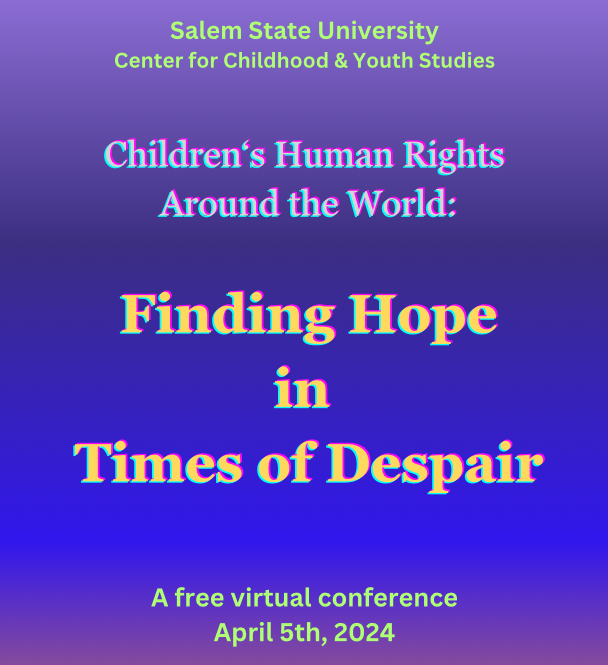
Salem State University & HRE USA
Children Around the World: What We Are Doing to Improve Their Lives
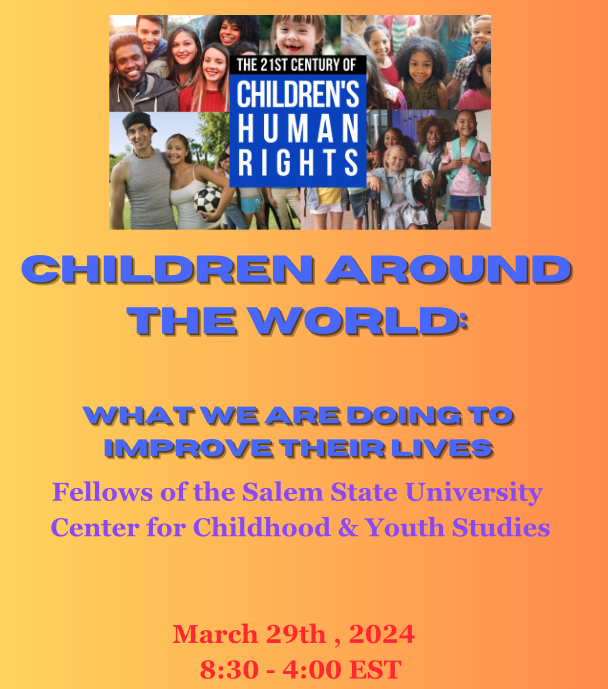
March 29, 2024 – 8:30 am – 4 pm (ET), virtual
Around the world, young scholars are focusing their work on research that is designed to change the world for the better. The Fellow at Salem State University Center for Childhood and Youth Studies will share their cutting-edge ideas! This conference focuses on diversity and inclusion, particularly in families, schools, education, criminal justice, and in the challenges that refugee children face.
This is a free, open to the public virtual conference. CEUs are available upon request.
This conference is an educational opportunity provided by the SSU Center for Childhood & Youth Studies.
SPRING 2024 Training as Action Series (TAAS)
Human Rights Educators USA’s annual Training as Action Series (TAAS) is a virtual training series focused on bridging personal and collective action on some of the most critical human rights issues of today. TAAS creates an educational space to connect and collaborate with others in human rights education and training. It also gives participants the skills and information needed to take action on rights issues in their communities. The 2023-2024 training series will celebrate the 75th anniversary of the Universal Declaration of Human Rights (UDHR) and center on the theme, “Protecting Democracy, Promoting Human Rights.” Sessions will discuss topics such as voting rights, facilitating difficult conversations, organizing an advocacy campaign, communicating with decision makers, protesting, and mental wellness.
Thank you to all the Co-Sponsors 2023-2024 TAAS Series!
Download a flyer for the upcoming TAAS Sessions in February and March, 2024.
Voting Rights: What You Can Do to Combat Voter Suppression >> Download Flyer

Monday, March 25, 7pm ET
Summary
The right to vote as established in Article 21 of the UDHR is the bedrock of democracy and essential to the fulfillment of other rights. Yet this fundamental right is under attack. This module is designed to address the problem of voter suppression and voter apathy by engaging participants in ways they can promote voting and voting rights in their own communities and classrooms
Objectives
- Establish the importance of voting and civic engagement to human rights and democracy
- Discuss modern day voter suppression and voter apathy
- Develop ways to promote the vote and combat voter suppression in one’s own community
TAAS Global Screening & Conversation: Human Rights Education: Empowering Youth to Promote Gender Equality Flyer

March 16, 2024
Register in advance: https://zoom.us/meeting/register/tJwpdOmppjoiG9cYN-dHIkETDRTrJtcUBH8F
This HRE USA TAAS Special Global Screening, co-sponsored by the Office of the UN High Commissioner for Human Rights (OHCHR), Amnesty International (AI), and Soka Gakkai International (SGI), is centered around the multimedia resource “Changemakers: Stories of Young Human Rights Educators.” Launched in December 2023 by AI, SGI, and the OHCHR, this resource aims to inspire and empower young people to advocate for human rights causes.
Summary and what to expect:
- Screening: Be captivated by the stories of three remarkable young human rights educators whose lives have been transformed by their commitment to human rights education.
- Interactive Discussion: Engage in a thought-provoking dialogue on the role of youth in promoting gender equality through human rights education.
- Q&A Session: Hear directly from three inspiring individuals featured in the multimedia resource
- Ms. Dejana Stosic from Serbia (gender equality and gender-based violence)
- Mr. Soufiane Hennani from Morocco (gender diversity and equality)
- Ms. Aizat Ruslanova from Kyrgyzstan (women’s human rights)
Objectives:
- Present stories of youth empowerment through human rights education, as documented in the multimedia resource.
- Provide a space for dialogue on human rights education for, with and by youth as a tool to promote human rights, including gender equality.
- Discuss ideas on how to utilize the multimedia resource as well as other innovative formats to strengthen human rights education for youth in formal and non-formal contexts.
The event is designed for young individuals and anyone in the general public passionate about advancing human rights and gender equality. Let’s unite to empower youth as effective advocates for gender equality and human rights.
Finding Joy: Integrating Mental Wellness into Your Advocacy Strategies >> Download Flyer
Monday, February 26, 2024 – 7-9 pm ET
Summary
Human rights work often takes an emotional toll on its practitioners, but there are ways to mitigate this toll and find joy and solidarity in the work. This final module aims to explore how to integrate wellness strategies into the various actions discussed throughout the training series, and to establish the importance of self-care in order to care for others.
Objectives
- Understand the importance of maintaining mental wellness during human rights work
- Discuss ways to find joy and solidarity
- Explore how to integrate mental wellness strategies when organizing advocacy campaigns, protests/demonstrations, and other human rights initiatives
2023

HRE USA Announces 2023-2024 Training as Action Series (TAAS)
Human Rights Educators USA’s annual Training as Action Series (TAAS) is a virtual training series focused on bridging personal and collective action on some of the most critical human rights issues of today. TAAS creates an educational space to connect and collaborate with others in human rights education and training. It also gives participants the skills and information needed to take action on rights issues in their communities. The 2023-2024 training series will celebrate the 75th anniversary of the Universal Declaration of Human Rights (UDHR) and center on the theme, “Protecting Democracy, Promoting Human Rights.” Sessions will discuss topics such as voting rights, facilitating difficult conversations, organizing an advocacy campaign, communicating with decision makers, protesting, and mental wellness.
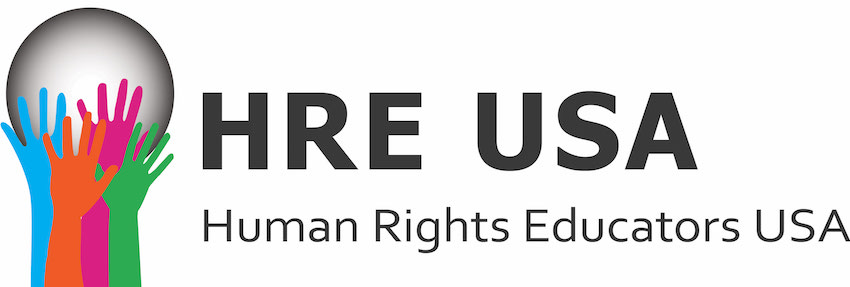
Learn about HRE USA TAAS events in March and April, 2023, here!
2022
December
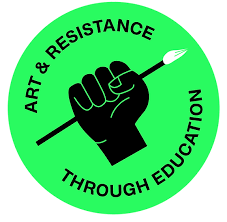
December 3, 2022
10:00 am to 4:30 pm
BCNY Gerry Clubhouse, 321 E 111th St, New York, NY 10029
Stoking the Fire of Creative Resistance, a professional development workshop for educators, activists, and artists
Sponsored by Art and Resistance Through Education (ARTE), this full-day interactive, participatory arts workshop is recommended for: teachers, educators, non-profit leaders, artists, activists, social workers, youth leaders, teaching artists, and others!
Workshop registration and light breakfast will start at 9:30am. Participants will be responsible for their own lunch, but snacks will be served. As a follow-up to this workshop, we’ll be offering an optional, virtual check-in to put into practice what we’ve learned together.
For more information, including registration information, please see this website page: artejustice.org/professionaldevelopment
November
Brainstorming Workshop: Decolonizing Curriculum and Pedagogy in Human Rights and Beyond – Part 2
Please join us for a brainstorming session about decolonizing pedagogy and curriculum, especially what are the best ways to assess such a critical
undertaking. The focus of this workshop will be on deploying the Decolonial Pedagogy and Curriculum Inventory (DPCI) in a decolonial manner. This will be of interest to all those seeking to incorporate decolonial pedagogy and curriculum, and assessing them from a decolonial perspective.
This is the second part of a two-part workshop. Part 1 was held in May 2022. New material will be presented and brainstormed. You need not have attended Part 1 to attend Part 2.
Access the DPCI here
Many academic programs around the globe are seeking to develop more decolonial pedagogies and curricula, but there is not an easy way to determine how decolonial a program is and in what areas it needs to improve. Faculty and students at the University of Arizona have developed a draft pool of items that can be used to address these issues and they are seeking input from a wide range of stakeholders to modify the pool of items and to determine the best way to deploy such a scale in a range of contexts.
Facilitated by:
William Paul Simmons, University of Arizona Bianca Nightengale-Lee, Florida Atlantic University
Ana Cornide, University of Arizona
Victoria Vertein, Pima Community College
Sophie Alves, University of Arizona
This project is made possible in part through funding from CUES, the Center for University Education Scholarship at the University of Arizona.
September
Monday, September 26. 2022 from 7:30pm-8:30pm ET: Human Rights Educators USA in a Nutshell
>> Register in advance for this meeting
Save the Date: Monday, October 3, 7pm–9pm ET: Human Rights & Human Rights Education
June
Children’s Human Rights in the USA: Virtual conference
The registration is open for the June 22-24, 2022 conference on Children’s Human Rights in the USA. It is a virtual zoom conference with over 50 speakers that is sponsored by the Center for Childhood & Youth Studies at Salem State University, with co-sponsors such as Human Rights Educators USA, the Hope for Children CRC Policy Center, UNICEF USA, Child Fund Alliance, Child Welfare League of America, and others. This is a free conference via zoom but you must register.
Topics include safety, trauma, resilience, participation, health, education, law, mental health, gun control, special needs children, environment, and much more. For more information on the speakers and schedule visit this page.
Continuing Education Credits are available.
To learn more about the importance of children’s human rights, please review the Children’s Human Rights Resource, Networking, and Learning Library: https://canvas.instructure.com/enroll/GLKDXX

Register here
Wed, 29 June 2022
10:30 – 11:30 CDT
Developing political compassion through narrative imagination in human rights education Iida PYY, University of Helsinki, Finland
In this presentation, Iida Pyy explores the work of Martha Nussbaum, arguing that political compassion is a necessary disposition for engaging with human rights principles and combatting social injustices such as racial discrimination. Drawing from Nussbaum’s theory of political emotions, she explores the need to understand compassion as connected to cognition and practical reasoning. Iida Pyy offers suggestions of how to educate towards political compassion in human rights education (HRE) through Nussbaum’s notion of narrative imagination. In order to address ways in which human rights education may be partial and counteract this tendency with alternative perspectives, the presenter draws on the work of critical HRE scholars and emphasises the importance of counter-narratives and reflective interpretation of narratives. She suggests that Nussbaum’s work on compassion and narrative imagination, informed by such critical considerations, opens up opportunities to look afresh at HRE theory and practice and inform thinking about rights, emotions and social justice.
April

Wed, 27 April 2022
10:30 – 11:30 CDT
Register here
Human rights education as a framework for transmitting religion as cultural heritage
Eva Lindhardt, University College Copenhagen, Denmark
The child’s right to freedom of religion and belief and fundamental principles such as equality and non-discrimination constitute an international frame for religious education (RE). However, these rights risk being undermined when RE is allocated a major role in transmitting the majority religion as national cultural heritage and national identity. In this presentation Eva Lindhardt will explore and discuss this question. She will draw on her analysis of the transmission of Christianity as cultural heritage in the national RE curriculum for primary and lower secondary schools in Denmark. She argues that human rights education principles could provide a basis for an alternative pluralistic, objective, and critical approach to RE, thus enabling the classroom to function as a community of disagreement. The author’s full paper is Lindhardt, E. (2022). Human rights education as a framework for transmitting religion as cultural heritage. Human Rights Education Review, 5(1), 5–27. https://doi.org/10.7577/hrer.4452. https://humanrer.org/index.php/human/article/view/4452

https://www.facebook.com/URockHRE
April 25, 7:00-8:00pm, EST
“Weaving Out of the Web”
UROCK! and HRE USA Web Presentation
Fly out of life’s catastrophes to dive in and explore key human ontologies of identity, inclusion, and exclusion – linking our work to the real work of the UDHR and related Conventions. This workshop provides a Behavioral Psychological approach to the Arts and Human Rights.
Peter DiGennaro, M.A. (Arts Politics, Human Rights Ed.) Director, URock! HRE
The human instinct of artistic practice – the physicalized expression of our inner self as it relates to the outer world – is integral and essential, whether we sense it or not, to personal and community wellness and wisdom. Through this simple and fun Human Rights and Peace Education exercise, Peter DiGennaro (Director, URock! Human Rights) introduces participants to the “Poetics of Intimation” – a sense-event through the arts of movement (Zoom Hand Dancing!) and writing (Crazy Poetry!) that playfully examines the critical issues of human ontology: identity, inclusion, and exclusion. Attendees of any artistic “skill” level and genre – or none! – are welcome as we ripen our own processes of investigation, while linking what appears in our work to specific, formal articles of the Universal Declaration of Human Rights and its related Conventions.
This introductory or second-step Human Rights & Peace Education exercise can be used as an icebreaker, as a more immediate unveiling of experience and memory, and/or as creative source material when attending to the witness of exclusion and inclusion. Notably, the exercise fosters a distinct practice of trust-possibility – with oneself and with others – given the concurrent personally and privately managed levels of sharing, now coupled to the informative practice of artistic process preserved within the investigation. Though basic in construct, and fairly brief in execution, this exercise is both reflective and reflexive in its scaffolded design, gradated process, and analog production, presenting a “door-opener” to greater personal and social capacity, consciousness, and courage to engage. Oh…and it’s FUN!

Wed, 6 April 2022
10:30 – 11:30 CDT
Register here
Examining relationships and sex education through a child rights lens: an intersectional approach
Francesca Zanatta, Cass School of Education and Communities, University of East London, UK.
In this presentation, Francesca Zanatta examines how teaching and learning about rights in an intersectional way can inform the topic of Relationships and Sex Education (RSE), drawing on her experiences of teaching an undergraduate child rights module. The module, designed for future educators, intersects elements of children’s rights education with the theoretical positions of queer studies and critical pedagogy. Drawing on data from two focus groups, consisting of students following the programme, she analyses students’ views and attitudes to RSE, using Foucault’s overarching concept of problematisation and the concept of sites of struggle. Data analysis reveals tensions and potential clashes between the students’ professional selves, their personal values, and elements of the theoretical framework adopted in the course. These tensions are nevertheless constructive, highlighting the potential of children’s rights education to contribute to transformative human development. The author’s full paper is Zanatta, F. (2021). Examining Relationships and Sex Education through a child rights lens: an intersectional approach. Human Rights Education Review, 4(1), 49–69. https://doi.org/10.7577/hrer.3991
It can be accessed at: https://humanrer.org/index.php/human/article/view/3991
March
Critical Thinking Under Fire: Upholding Academic Freedom in the Classroom
Efforts to ban certain subjects from classroom discussion are underway. Critical thinking is being suppressed & educators are at risk.
Across the globe efforts are intensifying to censor study of controversial issues, notably those dealing with the study of racism and cultural diversity in public education. Providing education on these subjects is critical to confronting and dismantling systemic racism and building literacy on gender, sexuality, and identity diversity. These are core concepts embedded in human rights that are supported by international human rights guiding principles and standards.
In the US, a handful of states have recently passed legislation limiting or banning these subject areas and establishing punitive actions against educators who are seen as introducing these concepts into the classroom.
In this session we will hear from a panel of individuals who will help us to better understand the polarization of education in the US, how “divisive concepts” and CRT bans are being used to censor academic freedoms and penalize educators for doing their job to teach critical thinking. Join us and share your questions and thoughts about the role of the human rights community in this national discourse.
Speakers:
Astha Bhandari is a senior in high school and Amnesty International USA’s Legislative Coordinator for North Carolina. Astha is active with her school’s Amnesty International Student Group and is an advocate for greater academic freedom in the classroom.
Matthew Hawn: For 16 years, Matthew taught Economics, Contemporary Issues, and Personal Finance at Sullivan Central High School. On May 5, 2021, the Sullivan County Department of Education dismissed Matthew for teaching racial justice in his contemporary issues course. He is appealing the dismissal to the Sullivan County Chancery Court.
Svetlana Mintcheva is a strategy consultant working with program activities at the New York based non-profit, National Coalition Against Censorship (ncac.org) (where she was formerly director of programs). She writes on emerging trends in censorship, organizes public discussions and mobilizes support for individual artists, curators, authors, teachers and librarians. Dr. Mintcheva is the co-editor of Censoring Culture: Contemporary Threats to Free Expression (The New Press, 2006) and of Curating Under Pressure: International Perspectives on Negotiating Conflict and Upholding Integrity (Routledge, 2020). An academic as well as an activist, Dr. Mintcheva has taught literature and critical theory at the University of Sofia, Bulgaria and at Duke University, NC from which she received her Ph.D. in critical theory in 1999, as well as at New York University. Her current research focuses on the challenges to the concept of free speech posed by social media, social justice movements and political polarization.
Jack L. Nelson: Distinguished Professor of Education, emeritus, Rutgers University. Co-author, Critical Issues in Education, 16 other books. Former professor, CSU, Los Angeles, University of Buffalo; Visiting scholar, Cambridge University, Stanford, Berkeley, Sydney, others. Former member, AAUP Committee A (academic freedom), NCSS Academic Freedom Committee, ACLU New Jersey board. Member, Amnesty International.
Dr. India Thusi is a Professor of Law at the Indiana University Bloomington Maurer School of Law and a Senior Scientist at the Kinsey Institute. Her research examines racial and sexual hierarchies as they relate to policing, race, sexuality, and gender. She was selected as a Fulbright U.S. Global Scholar for 2020-2023.
Her past work has been selected for the 2020 Stanford/Harvard/Yale Junior Faculty Forum; Honorable Mention for the Law & Society John Hope Franklin Award; and the 2021 Equality Law Scholars’ Forum.
Professor Thusi is an award-winning writer and scholar, and she was recognized as a Top 40 Rising Young Lawyer by the American Bar Association in 2019 and a Top 40 Under 40 Emory University Alum in 2020.

REGISTER HERE!
Learn more about the Water Warriors here.
Access the curriculum here.
HRE USA “Water Warriors Webinar” by Elana Haviv
Water Warriors is a multimedia-based curriculum that guides students in an exploration of our most valuable resource, WATER, through human rights and Indigenous lenses. The lessons enable students to step into the roles of water warriors (protectors). Students gain an understanding of the vital importance of water as the source and sustenance of life and develop the skill sets needed to investigate water issues in their own communities Participants will:
- Utilize new pedagogical tools such as storytelling to guide their students to view issues of water through different perspectives.
- Strategize on where water rights and stewardship fit within curricular subjects, core standards, school-wide initiatives, and teacher training programs.
- Collaborate in small groups to design classroom or school partnerships around water rights and stewardship lesson activities integrating learning and civic action.
- Analyze multimedia-based class lessons about water and cross-curricular connections within arts, civics, computer, history, humanities, science, and school activism clubs.
- Share ideas for mobilizing youth to take action in implementing water rights projects in their communities.

UPCOMING WEBINAR 1
16 March 2022
17.30-18.30 (Berlin CET); 16.30 – 17.30 (London/Dublin)
Register here
WEBINAR 2: 6 April 2022
17.30-18.30 (Berlin CET); 16.30 – 17.30 (London/Dublin)
WEBINAR 3: 27 April 2022
17.30-18.30 (Berlin CET); 16.30 – 17.30 (London/Dublin)
WEBINAR 4: 25 May 2022
17.30-18.30 (Berlin CET); 16.30 – 17.30 (London/Dublin)
WEBINAR 5: 29 June 2022
17.30-18.30 (Berlin CET); 16.30 – 17.30 (London/Dublin)
The Editors of Human Rights Education Review and the Convenors of the WERA International Research Network on Human Rights Education are pleased to announce that our 2022 Research Webinars will run from March – June 2022 on Wednesdays 17.30-18.30 (Berlin CET); 16.30 – 17.30 (London/Dublin).
WEBINAR 1: The rhetoric and reality of human rights education: policy frameworks and teacher perspectives
Audrey Osler, University of South-Eastern Norway, Norway and University of Leeds, UK
Jon Arne Skarra, University of South-Eastern Norway, Norway
What happens when school curricula equate human rights principles with a particular religious or cultural tradition? Audrey Osler and Jon Arne Skarra consider education policy discourses in Norway, noting human rights as a key feature of national identity, said to underpin schooling. They illustrate how education policy maintains distinctions between those who embody national values and migrant others who need to learn them. They look closely at the human rights-related competences students are expected to have on completing 10th grade, examining social studies and religious education curricula and teacher interview data. Teachers have a lot of autonomy in selecting the knowledge though which these competences will be taught. The presenters consider whether the curriculum supports transformative human rights education (HRE), empowering learners to defend others’ rights and build solidarity across difference. Data suggest that HRE is frequently implicit, restricted, and dependent on teachers’ individual perceptions of rights. Teachers may lack legal knowledge and are unsure how to tackle everyday injustice or racism. Osler and Skarra conclude that a multicultural society and curriculum that equates Christian and humanist values with human rights denies pluralism, placing human rights culture at risk. They recommend education policy explicitly address shared HRE principles and recognise racial injustice. The authors’ full paper can be read here
Recordings of past webinars will be posted on YouTube Channel
2021
November
Revisiting the past: human rights education and epistemic justice Rebecca Adami, Stockholm University, Sweden
In this webinar, Rebecca Adami invites us to look afresh at history and at the historical narratives surrounding the founding of the United Nations and the modern human rights project. She highlights a colonial historical trajectory of human rights that rests on accounts of western agency, with scholarship and teaching leading many to assume that the human rights project is exclusively western in its origins. Such historical narratives overshadow the legacy of Indian and Pakistani freedom fighters and Latin American feminists who negotiated human rights against colonial, patriarchal and racist discourses after World War II. By ignoring their contribution, the UN human rights concept risked reduction to a western trajectory on the ‘Rights of Man’, representing monistic universalism. In the webinar, Adami revisits United Nations history, unearthing historical counternarratives of what a pluralistic universalism of human rights might mean. She presents fresh knowledge and recounts the struggles of postcolonial feminist subjects who brought alternative understandings of rights and means of challenging injustice.
October

Wednesday, October 13, 2021
17.30-18.30 (Berlin CET)
16.30 – 17.30 (London GMT)
11.30 -12.30 (New York EST)
08.30-09.30 (Seattle PST)
Talking about rights without talking about rights: on the absence of knowledge in classroom discussions
Lee Jerome, Middlesex University, UK, Anna Liddle, University of Leeds, UK and Helen Young, London South Bank University, UK.
In this webinar, the presenters report on research in secondary schools where students were engaged in deliberative discussion of controversial issues and rights-based dilemmas. Building on the premise that educators need to be more explicit about the human rights knowledge underpinning the school curriculum, they argue that HRE necessarily requires the development of political understanding, which moves beyond individual empathy; educators need to value the process of deliberative discussions and avoid a push for conclusive answers; and students need support to draw on knowledge from a range of disciplines. They assert that if these issues are not addressed, some students are able to engage in rights-based discussions with little knowledge and understanding of rights. The presenters’ full paper can be read here.
September
NEW 2021-2022 HRE USA Training As Action Series (TAAS)
The Universal Declaration of Human Rights Preamble (1948) contains a call for “all peoples and all nations” to promote respect for human rights and freedoms through such means as teaching and education. HRE USA responds to this call through the promotion of human dignity, justice, and peace by cultivating an expansive, vibrant base of support for human rights education within the United States.
Since our founding in 2011, HRE USA has established a strong base of 1100 educators across the country: a group of individuals and organizations united by the goal of providing impactful and accessible human rights education for all.
On the 10th anniversary of its founding, HRE USA is launching a new 2021-22 Training As Action Series (TAAS) focused on bridging the personal and collective on some of the most critical human rights issues of today. TAAS fosters a productive and creative educational space to connect and collaborate with others in the HRE USA community with the goal of reaching a common understanding and shared language.
Participants will leave each session of the training series with a renewed energy and the practical tools necessary to facilitate conversations and promote collective action with students and community members writ large.
The 2021-22 HRE USA Training As Action Series (TAAS) will feature a scaffolded three-tier training model. Each tier builds upon the next in terms of depth, participation, and engagement. The trainings are designed to meet the diverse needs of our members. Participants are welcome to register for Tier 1 only, Tier 1 and 2, or all three tiers as they are interested.
Tier 1 (2 modules, Sep/Oct) will provide general grounding in human rights and human rights education applications, including understanding ways to engage within the various committees, action teams, and working groups of HRE USA.
- Monday, September 20 – 7:00-8:30pm ET
- Monday, October 4 – 7:00-8:30pm ET
Tier 2 (4 modules, Oct/Nov) will engage HRE USA members in interactive human rights training on urgent topic areas in ways that are applicable to their personal, collective, and professional contexts.
- Monday, October 18 – 7:00-9:00pm ET
- Monday, October 25 – 7:00-9:00pm ET
- Monday, November 1 – 7:00-9:00pm ET
- Monday, November 8 – 7:00-9:00pm ET
- + 2 optional Saturday sessions: Oct 30 and Nov. 6 – 11:00am-1:00pm ET (deeper working session dive)
Tier 3 (2 modules, Dec/Jan) will develop the HRE USA Training Corps focused on improving, planning, and implementing ongoing community building and training efforts.
- Monday, December 6 – 7:00-9:00pm ET
- Monday, January 10 – 7:00-9:00pm ET

WEDNESDAY, SEPTEMBER 15
17.30-18.30(Berlin CET)
16.30 – 17.30 (London/Dublin)
10.30AM – 11.30AM (CDT)
Virtual Webinar
Human rights education in Iceland: transformative pedagogies and upper secondary school teachers’ stories
Presenter: Susan Gollifer, University of Iceland, Iceland
Description: Although we witness human rights violations daily, and the right to human rights education is articulated in human rights instruments, HRE is not a recognised field of social justice education in Iceland, but assumed in multicultural, sustainability and citizenship learning. Susan Gollifer draws on the life stories of upper secondary school teachers to consider how their stories might inform and extend our understandings of transformative HRE. She illustrates how teachers’ reported practices are reflective of learning through rights rather than about and for human rights. Human rights risk being trivialised. Yet teachers’ reasons for working with human rights, and their perceptions of systemic challenges, can be used to inform teacher education. Sue Gollifer concludes it is problematic to discuss HRE as transformative pedagogy in the context of conservative upper secondary schools. She considers how teacher education might sustain human rights cultures, raising questions of significance for teacher education internationally.
MAY

| WEDNESDAY, MAY 12 11:30 – 12:30 ET Virtual Webinar |
| REGISTER HERE |
Decolonial human rights education: Changing the terms and content of conversations on human rights
Presenter: Anne Becker and Cornelia Roux, Stellenbosch University, South Africa
Description: Who is included in the ‘Human’ of human rights education? This webinar draws on data from the research project Human rights literacy: Quest for meaning, led by Cornelia Roux and on a paper by Anne Becker to be published in HRER Volume 4(2). The presenters invite us to reflect on the terms and content of human rights education, and to consider what a decolonial HRE might look like. They will consider the terms of our conversations and reflect on principles, assumptions and rules of knowing. These terms and HRE content are interrelated and sustained by continual movement between them. Decoloniality resists global coloniality of power, ontologies and epistemologies which are consequences of colonisation. The session will examine the Eurocentric assumptions and principles which frequently serve as premise for human rights and human rights education, arguing that researchers and educators need to explore pluriversal knowledges of human rights and problematising the Human of human rights. They will conclude with some thoughts on decolonising human rights education. Anne Becker’s paper can be read here
